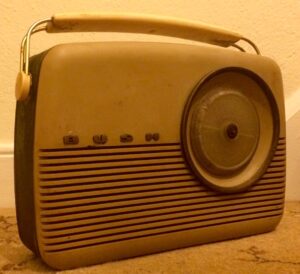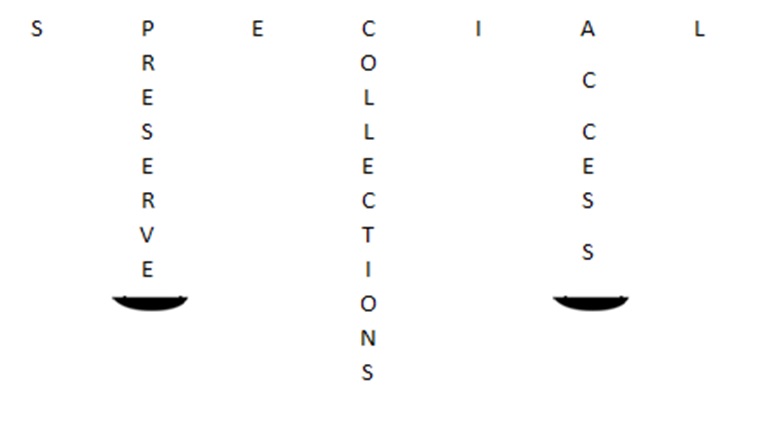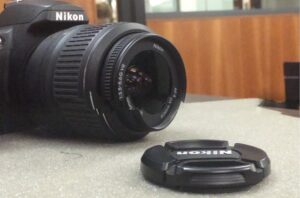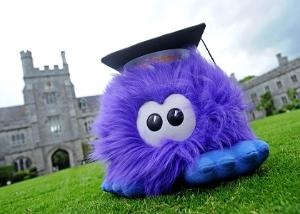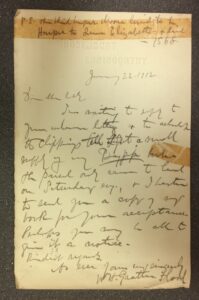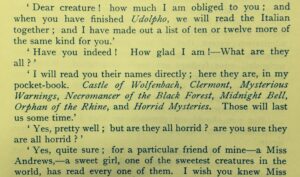UCC’s Special Collections on Shush! Sounds from UCC Library
- Elaine Harrington
- January 31, 2017
Recently I was asked to record a segment about UCC Library’s Special Collections for a music & library radio chat show: Shush! Sounds from UCC Library. The show is hosted by Martin O’Connor & Ronan Madden for UCC 98.3 FM Monday mornings 11:00-12:00 and Shush! also podcast their shows on SoundCloud. Naturally I was delighted to participate and showcase the different types of engagement we have with staff and students.
Recording for Radio
I was a little wary about being recorded at the start but Ronan & Martin soon put me at my ease and I forgot that the recorder was there. It helped that I’m used to talking about what Special Collections is to a variety of people: from primary school students to postgraduates to lecturers to a variety of library staff at conferences. The disadvantage of course was I was without my usual set of props: Special Collections as a location and the myriad of items that I use there. I’d need to work hard to convey what Special Collections was in the absence of visual cues.
To hear more about Special Collections and the possibilities for engagement click here for the recording on SoundCloud.
What is Special Collections?
Special Collections is home to UCC’s unique collections of literary manuscripts, early printed books pre-1850, books from presses, collections donated from individuals, 18th – 20th century newspapers, theses, maps, pamphlets and microfilm. All Special Collections’ material must be used in Special Collections and cannot be borrowed. For many people ‘special collections’ and ‘archives’ are used as interchangeable terms but in UCC Library although there are shared spaces we administer them separately and the content is different for both. I consider Special Collections being concerned with published matter, even if only one copy survives, as well as related published material such as microfilm and maps, as well as manuscripts. Emma Horgan, UCC Library’s Archivist, describes archives as “records naturally created in the course of everyday business, public or private, which merit preservation because of their unique information content.” So not my Christmas card list then!
How do I reconcile open access library-wide with rules in Special Collections? Why is Special Collections different? Balancing the desire to access the items with the need to preserve the items is key. Staff need to be present in the section for Special Collections to be open; this is to ensure the care and security of our collections. It’s when I give examples about how material can be damaged in our lives outside of Special Collections such as using a book while baking and having the ingredients drop onto the book leaving marks and stains, that our users see the value and reason as to why the rules exist.
New Horizons: Special Collections & Academic Staff
I believe that if postgraduates are to use Special Collections then let’s build the foundations at undergraduate level where students can become familiar with Special Collections.
“Can I bring my students to Special Collections?”
Yes please! Let’s meet to discuss.
As Tom O’Mara said in his recent podcast “it’s about having a conversation.”
A conversation with Dr Jill Rogers saw a mixed group of 2nd/3rd years visit Special Collections. This visit was followed by MA students visiting for a newly created module on soundscapes and musicology. The conversation Jill and I had meant that Special Collections’ range of historical sources, such as Beauford’s map of Cork, were incorporated into the module. These historical sources should encourage students to consider the intersections between history and geography and provide clue as to what various locations in Cork might have sounded like in the past. A third outcome of the initial conversation was a conversation with Dr Melanie Marshall about her 60 strong class of first year undergraduates using Special Collections. The class will visit Special Collections in two groups over the next fortnight to examine a variety of Special Collections’ & Archival material for their assignment.
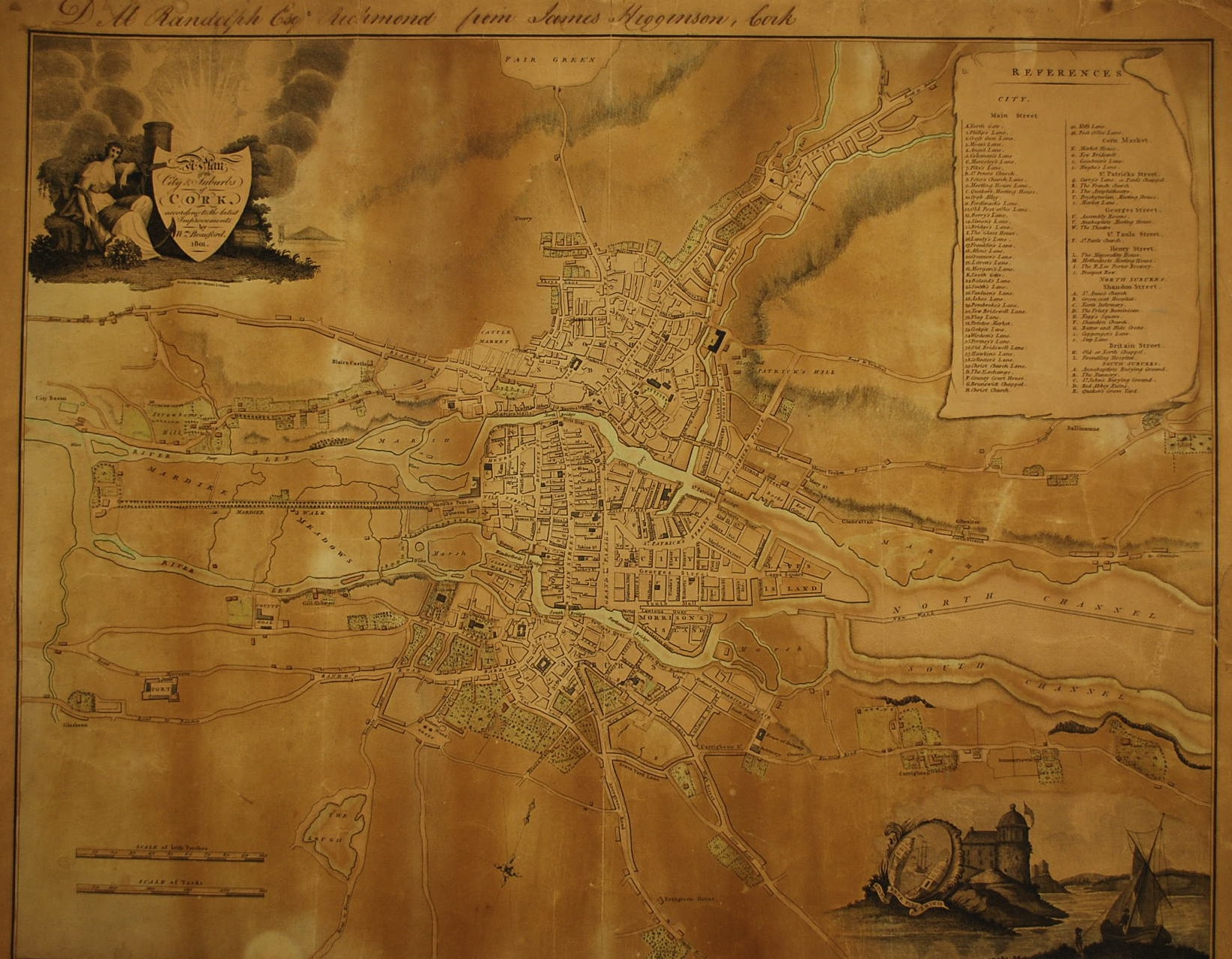
A separate conversation with Dr Małgorzata Krasnodębska-D’Aughton, Dr Damian Bracken and Dr Diarmuid Scully saw a different new module created in the School of History: Skills for Medieval Historians co-ordinated by Małgorzata Krasnodębska-D’Aughton. This module gives postgraduate students in History the opportunity to combine their history and writing skills to produce a body of work intended to be read by the general public. Over the course of the second semester students on this module will design an online exhibition based on resources available in UCC Library’s Special Collections and present it as a series of blog posts. Stay tuned for those blog posts coming to The River-side in March / April 2017!
These new connections stand alongside frequent fliers to Special Collections and each use Special Collections with a different lens:
- 2nd year and MA Archaeology students who use Special Collections’ historical resources in a similar manner to the musicology students but to add context to field-work in Archaeology. Special Collections’ archaeological resources add that ‘special’ feeling that isn’t found when viewing the OSI Historic Map Viewer.
- 2nd and 3rd year Irish language students who use Special Collections for manuscript studies, albeit manuscript studies with a research-focused hands-on approach. Prof. Pádraig Ó Macháin created a research manuscript module (Tionscnamh Taighde) where 3rd year students create a catalogue entry for a manuscript held in Special Collections. In 2015 at the National University of Ireland awards a Mansion House Fund Scholarship in Irish was awarded to Máiréad Carey on the basis of results achieved in her final year. Her work on the research manuscript module in 3rd year contributed substantially to the award’s process and was deemed to be work far beyond that of an undergraduate.
- In addition students of Early & Medieval Irish, English, History, Folklore and Languages from first year to MA level use Special Collections and visits are incorporated on an annual basis into their respective schedule of classes.
Special Collections’ Exhibitions & Events
Over the last ten years there have been exhibitions on Q floor of the Boole Library with all Colleges in UCC. These either have been exhibitions curated by departments and schools or exhibitions created in collaboration with UCC Library. For example over the last two years all departments in the School of Languages, Literatures and Culture have had exhibitions:
- Dante’s Inferno (Dept. of Italian with Dr Daragh O’Connell)
- Guy Debord (Co-curated by Crónán Ó Doibhlin, UCC Library and Dr Paul Hegarty and Dr Patrick Crowley, Dept. of French)
- 400th Anniversary of Cervantes (Dept of Spanish, Portuguese & Latin American Studies with Dr Stephen Boyd who also wrote about his experience of creating an exhibition)
- Casper Walter Rauh (Dept. of German with Dr Gert Hoffman)
In September 2016 Special Collections collaborated with Dr Edel Semple in the School of English for Culture Night. Edel gave a public lecture in the Boole Library on “Shakespeare’s Sources and the Boole Library’s Resources.” As she notes in the blog post she wrote after the event the talk “sought to explore Shakespeare’s use of his sources and to give a general introduction to book history using the Library’s rare, early printed books.” In addition the lecture was part of the British Council ‘Shakespeare Lives’ programme to commemorate the 400th anniversary of Shakespeare’s death.
Providing a Spark: Special Collections & Students
Can I convince the ‘everything is on Google’ cohort that Special Collections should be used? Hmm! How to do this?
One way is through UCC’s Professor Fluffy Tours. Professor Fluffy is a model designed by the University of Liverpool to widen participation in third level education in disadvantaged areas. Professor Fluffy and friends raise awareness of the impact of education on improving career and life opportunities. These tours are given to primary school children.
Another way is through the School of BEES Transition Year programme. The programme runs for a week and students have the opportunity to study areas like Plant Science, Zoology, Environmental Science and Geology, and work alongside BEES staff and students. Part of the programme includes a visit to UCC Library and Special Collections. As evidenced from the blog posts the students write in response to the programme the visit to Special Collections is well-received.
Both programmes are co-ordinated in UCC Library by Ann Byrne.
Students Using Special Collections
Students who use Special Collections gain a different skill set, possibly one more familiar to those of us who remember doing research before online databases and journals. Each year Bill O’Flynn visits Special Collections with 1st year students in Fine Art and in Contemporary Applied Art from CIT Crawford College of Art & Design. This visit is facilitated through CorkPal and the intention is for students to view and interact with items in order to inform their artistic endeavours. Bill O’Flynn noted that “physical objects have a presence that no reproduction or digitised object can approach.” There is a richness of material culture when viewing to books as objects. This is a view already shared by Archaeology staff and students.
Students who use Special Collections will work with primary sources and the secondary sources that support them. Working with primary source material requires a little bit of care and may be a tad frustrating at times. The material may be available in multiple formats e.g. the early 20th century newspaper An Claidheamh Soluis is available both on microform and on paper. Viewing microform can prove trying on one’s eyes but manipulating the large paper volume is trying in a different way.
A different challenge can be trying to read handwriting. Think about what your own handwriting is like in this age of text and type. How could it be read 100 years from now? Would it be easy? Recently I found a letter in a book which I found difficult to read. I thought this would be a good example to give to students to illustrate how working with special collections’ material can take time and this should be allowed for. The students successfully read the opening salutation, closing remarks & date. However it’s much harder to read this stand-alone letter in comparison to reading Boole’s handwriting as there’s a greater body of work for Boole and therefore we become more used to reading his handwriting. Try your hand at reading the letter!
My Favourite Part of Special Collections
It’s really hard to narrow down what my favourite part is as each day is different and subject to ongoing projects, I can make of it what I’d like it to be. I can work at the Special Collections Desk and see first-hand what kinds of queries students and staff have which means I’m better prepared for doing behind-the-scenes work. This behind-the-scenes work includes: teaching and outreach, liaising with colleagues to survey unique and distinctive collections held nationally and various special events such as a seasonal guide to Harry Potter: Behind the Scenes. The highlight to date has been lending The Orphan of the Rhine to the British Library for an exhibition on The Gothic.
To listen to Elaine Harrington, Special Collections Librarian talking about UCC Library’s Special Collections on Shush! Sounds from UCC Library click here.
Special Collections’ Contact Information
Elaine Harrington, Special Collections’ Librarian: e.harrington@ucc.ie | 021 4903484
Special Collections’ Desk: specialcollections@ucc.ie | 021 4902282
Special Collections’ Research Guide: For information on visiting and using Special Collections, what collections are present and highlights of the collections. http://libguides.ucc.ie/specialcollections
The River-side: Reflections on Research Collections: The purpose of the blog is to communicate information about research collections, projects and events in Special Collections and Archives at UCC Library. The River-side welcomes guest posts: https://theriverside.ucc.ie/. The River-side also has a complementary Twitter account: @theriversideUCC.
Shush! Sounds from UCC Library Contact Information
Facebook: Shush! Sounds from UCC Library
Twitter: @Shush_radio
SoundCloud: Shush! Sounds from UCC Library
